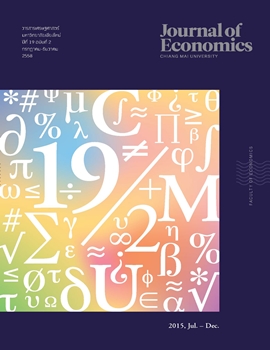การศึกษาผลสัมฤทธิ์ของการใหบริการ Microfinance ที่เกิดกับคนและชุมชนท้องถิ่นตามแนวทางปรัชญาเศรษฐกิจพอเพียง: กรณีศึกษา 8 จังหวัดภาคเหนือตอนบน
Keywords:
องค์กรการเงินชุมชน, ผลสัมฤทธิ์, ปรัชญาเศรษฐกิจพอเพียง, microfinance organizations, achievements, sufficiency economy philosophyAbstract
วัตถุประสงค์ของการศึกษาเพื่อศึกษาผลสัมฤทธิ์ที่เกิดจากการ ดำเนินงานขององค์กรการเงินชุมชน (Microfinance) ตาม แนวปรัชญาเศรษฐกิจพอเพียง ที่เกิดขึ้นกับคนและชุมชน ท้องถิ่น และศึกษารูปแบบองค์กรการเงินที่ชุมชนต้องการ โดยเปรียบเทียบการดำเนินงานระหว่างกลุ่มองค์กรการเงิน ชุมชนที่เข้มแข็ง (Best Practice) จำนวน 517 ตัวอย่างกับกลุ่มองค์กรการเงินชุมชนที่ยังไม่ เข้มแข็ง (Non - Best Practice) จำนวน 520 ตัวอย่าง ในพื้นที่ 8 จังหวัดภาคเหนือ ตอนบน คือ เชียงใหม่ เชียงราย ลำปาง ลำพูน พะเยา แพร่ น่าน และแม่ฮ่องสอน
ผลการศึกษาผลสัมฤทธ์จิ ากการดำเนินงาน ตามแนวคิดปรัชญาเศรษฐกิจพอเพียง พบว่ากลุ่มองค์กรการเงินชุมชนที่เข้มแข็งมีการนำแนวคิดปรัชญาเศรษฐกิจชุมชนในด้าน ต่างๆมาประยุกต์ใช้มากกว่า กลุ่มองค์กรการเงินที่ยังไม่เข้มแข็ง กล่าวคือ 1) ด้านความ พอประมาณ กลุ่มองค์กรการเงินชุมชนที่เข้มแข็งมีจำนวนสมาชิกที่ออมเงินมากกว่า มีความ สม่ำเสมอในการออม จำนวนเงินออมเฉลี่ยต่อเดือนสูงกว่า มีจำนวนสมาชิกกู้ยืมเงินน้อยกว่า มีปัญหาการชำระคืนเงินกู้น้อยกว่า 2) ด้านความมีเหตุผล กลุ่มองค์กรการเงินชุมชนที่ เข้มแข็งมีจำนวนสมาชิกนำเงินไปใช้ตรงตามเป้าหมายของการกู้มากกว่า 3) ด้านการมี ภูมิคุ้มกันที่ดี กลุ่มองค์กรการเงินชุมชนที่เข้มแข็งมีจำนวนสมาชิกทำบัญชีครัวเรือน บัญชี รับ-จ่ายมากกว่า มีการสร้างวินัยทางการเงิน การจัดการทางการเงินที่ดี 4) ด้านความรู้ สมาชิกของทั้ง 2 กลุ่มไม่ค่อยได้เข้าร่วมกิจกรรมการพัฒนาความรู้ความสามารถผ่านการ ฝึกอบรมและศึกษาดูงาน และ 5) ด้านคุณธรรม กลุ่มองค์กรการเงินชุมชนที่เข้มแข็งมี สมาชิกที่มีคุณธรรมในด้านการทำงานร่วมกันและอยู่ร่วมกัน การเสียสละ การทำงานเพื่อ ชุมชน และการปฏิบัติตนอยู่ในกฎ ระเบียบของกลุ่มมากกว่า
รูปแบบการให้บริการขององค์กรการเงินชุมชนคนในชุมชนต้องการ คือในกลุ่ม ชุมชนเมือง รูปแบบองค์กรการเงินชุมชนที่เปิดโอกาสให้คนในชุมชนเข้ามามีส่วนร่วม รับฟังความคิดเห็นของสมาชิก ไม่ดำเนินการเฉพาะกลุ่มในวงจำกัด สามารถตรวจสอบการ ดำเนินการได้ มีผลตอบแทนเงินฝากสูงและมีดอกเบี้ยเงินกู้ต่ำกว่าธนาคาร มีการค้ำประกัน ความเสี่ยงจากการผิดนัดชำระเงินกู้ มีระบบกู้เงินที่ไม่ยุ่งยาก ในกลุ่มชุมชนกึ่งเมืองต้องการ รูปแบบองค์กรการเงินชุมชนที่ควรมีคณะกรรมการกลุ่มที่มีความรู้ความสามารถ มีที่ปรึกษา กลุ่มที่มีประสบการณ์มีความรู้ความสามารถ มีความยืดหยุ่นในการปล่อยกู้ มีรูปแบบการกู้ที่ หลากหลาย และกำหนดวงเงินและอัตราดอกเบี้ยที่เหมาะสมกับแต่ละอาชีพ ในกลุ่มชุมชน ชนบทต้องการรูปแบบองค์กรการเงินชุมชนที่กลุ่มควรมีโครงสร้างชัดเจน แบ่งหน้าที่และ ระบบการทำงานที่ชัดเจน มีการฝึกอบรมให้ความรู้การจัดทำบัญชีแบบลงด้วยมือและควร ลดขึ้นตอนด้านงานเอกสารลง เป็นต้น
This study has the objectives to compare the achievements of the best practice and non-best practice microfinance organizations/groups in fostering the practices in line with the sufficiency economy philosophy at the individual and community levels and to understand the appropriate features in management and services that individuals and local communities wish to see in the operation of microfinance organizations/groups to fit their local settings. Area - wise, the present study was confined to 8 upper - northern provinces encompassing Chiang Mai, Chiang Rai, Lampang, Lamphun, Phayao, Phrae, Nan, and Mae Hong Son. Totally 1,037 samples of microfinance services users distinguishable into 517 and 520 samples in the best - practice and non - best practice group were interviewed, respectively.
The results revealed that the achievements of microfinance organizations in generating outputs in various dimensions covered in the sufficiency economy philosophy were found to be distinctly different between best practice group and non - best practice one. In moderation dimension, members of the best practice group had more savings, continuous savings, less loan, and less problems in payment than members of the non-best practice group. In reasonableness dimension, members of the best - practice group used loanable fund as what they set as objective for loan more than members of the non - best practice group. In immunization dimension, members of the best-practice group recorded their financial status and had a good management on their financial status more than members of the non – best practice group. In knowledge dimension, members of both groups were rarely participated in the training program of knowledge including study visit to other places. In ethical integrity dimension, members of the best-practice group had a community unity and strength, cooperation and participation in social activities, and played respect the rules more than members of the non - best practice group.
It was interesting to find local people to express their wishes to have their microfinance organization/group operating in the form and manner compatible with their circumstances. In the urban community category, the ideal microfinance organization was one that opened the opportunity for local people to participate, listened to the ideas of members, avoided working within a confined group, allowed for transparency audition, set higher interest rate for saving deposit and lower interest rate for loan in relative to the commercial banks’ rates, established loan repayment default risk guarantee system if possible, and has a simple loan application procedure. In the sub - urban community group, people wish to have the microfinance organization that has a committee comprising knowledgeable and capable, had group consultants with good experience and capability, gave flexibility in releasing loans, offered divers loan types, and determined the loan limits and interest rates appropriately for different professional background of the borrowers. In rural community setting, people desired to have the microfinance group that had a well-defined organizational structure as well as well-defined functions and work system, provided training on how to do book-keeping by hand, and simplifies the paper work procedures.
Downloads
Issue
Section
License
All opinions and contents in the CMJE are the responsibility of the author(s). Chiang Mai University Journal of Economics reserves the copyright for all published materials. Papers may not be reproduced in any form without the written permission from Chiang Mai University Journal of Economics.
ข้อคิดเห็นที่ปรากฏและแสดงในเนื้อหาบทความต่างๆในวารสารเศรษฐศาสตร์มหาวิทยาลัยเชียงใหม่ ถือเป็นความเห็นและความรับผิดชอบโดยตรงของผู้เขียนบทความนั้นๆ มิใช่เป็นความเห็นและความรับผิดชอบใดๆของวารสารเศรษฐศาสตร์ มหาวิทยาลัยเชียงใหม่
บทความ เนื้อหา และข้อมูล ฯลฯ ในวารสารเศรษฐศาสตร์มหาวิทยาลัยเชียงใหม่ ถือเป็นลิขสิทธิ์เฉพาะของคณะเศรษฐศาสตร์มหาวิทยาลัยเชียงใหม่ หากบุคคลหรือหน่วยงานใดต้องการนำทั้งหมดหรือส่วนหนึ่งส่วนใดไปเผยแพร่ต่อหรือเพื่อกระทำการใดๆ จะต้องได้รับอนุญาตเป็นลายลักษณ์อักษร จากวารสารเศรษฐศาสตร์ มหาวิทยาลัยเชียงใหม่





